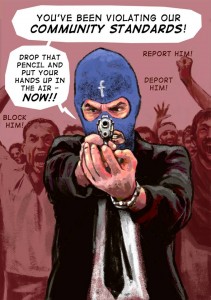Indian cartoonist Orijit Sen is no stranger to censorship. The artist, whose work has been repeatedly pulled from Facebook, recently spoke with Tehelka about why it is important that his “voice of dissent” rubs some people the wrong way and what future generations of artists can do to fight for free expression.
Orijit Sen is credited as producing India’s first graphic novel, River of Stories, and has recently gained international attention for his cartoons that challenge conventional perceptions of women in his home country. In 2015, Facebook pulled his work “The Punjaban,” which depicted a topless woman getting dressed in traditional Punjab garb, but with a twist. Clad in pink high heels and a whip at her feet, Facebook cited their infamous community standards policy which bans the depiction of female breasts in some circumstances (notably, there is an exemption for art, but Facebook is inconsistent in enforcing the policy).
Not deterred by Facebook’s actions, Sen decided to take on the social media giant by posting another nude cartoon called “She Came in Through the Bathroom Window,” which was also quickly pulled down. “Every time artists are prevented from doing what they would like, it is an attack on freedom of expression,” said Sen in his interview with Tehelka, adding:
And nobody should have the right to block someone from posting what they like, as an artwork is not a gun which is killing somebody. Through my art, I work hard to communicate some message. Always, in a broader sense, whether offline or online, I try to be the voice of humanity.
For Sen, his work is not only an opportunity comment on aspects of society, but it provides him with a “universal language” that audiences from around the world can relate and react to in a way that can incite social and perceptual changes. “I feel creative expression is one of the core aspects of human society, without which we would never be able to make the society progress and find new meanings to life,” said Sen.
Moreover, as a person in a “privileged position” Sen feels that it is his duty to be the portal through which those who can speak find a voice and to act as a leader that inspires future generations to fight for their freedom of expression. “Nowadays, I feel, there is a lot of oppression in our society, a tendency to stifle free voices and expressions,” Sen notes. “Hence it is becoming important for artists to speak for humanity and for those who do not have voices in some or other ways.”
Free expression and speaking out against censorship have been two major concerns in Sen’s artistic career. When asked what his message would be to the youths about the importance of free speech, his answer was clear:
Freedom of expression is a very vital and fundamental aspect of every society, which relies upon how creative the future is. My heartfelt message to the youth is: Fight tooth and nail all the time to preserve and expand the space of freedom of expression, because it is always under threat.
Read the full interview on Tehelka here.
Help support CBLDF’s important First Amendment work in 2015 by visiting the Rewards Zone, making a donation, or becoming a member of CBLDF!
Contributing Editor Caitlin McCabe is an independent comics scholar who loves a good pre-code horror comic and the opportunity to spread her knowledge of the industry to those looking for a great story!
